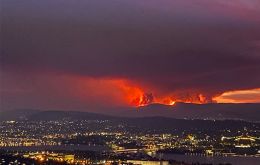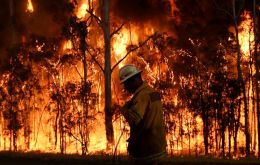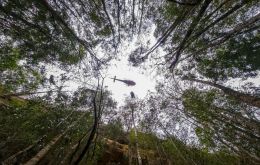MercoPress. South Atlantic News Agency
Tag: Australia
-
Thursday, April 2nd 2020 - 07:16 UTC
Australia to check some 9.000 crew in cruise ships stranded near Sydney

Australian police and military will soon begin flying doctors to several cruise ships stranded near Sydney to assess nearly 9,000 crew for COVID-19, officials said on Thursday.
-
Monday, March 16th 2020 - 11:18 UTC
France, Spain join Italy in imposing lockdowns for the next two weeks

France and Spain joined Italy in imposing lockdowns on tens of millions of people, Australia ordered self-isolation of arriving foreigners and other countries extended entry bans as the world sought to contain the spreading coronavirus.
-
Friday, January 31st 2020 - 10:23 UTC
State of emergency in Australia's capital surrounded by bushfire

Australian officials declared a state of emergency for the capital city of Canberra and surrounding regions on Friday, as soaring temperatures and strong winds threatened to propel a large bushfire beyond the control of firefighters.
-
Monday, January 27th 2020 - 07:58 UTC
One in two Australians have donated money to support bushfire relief efforts

One in two Australians have donated money to support bushfire relief efforts, a new survey showed over the weekend, with meteorologists warning more hot and dry weather is to return after a heavy rain respite dampened many of the blazes.
-
Thursday, January 23rd 2020 - 08:45 UTC
Sydney, Canberra, Melbourne again threatened by high temperatures and bush fires

Soaring temperatures are set to stoke simmering bushfires in Australia's southeast on Thursday with Sydney forecast to hit 41 degrees Celsius following a few days of reprieve.
-
Thursday, January 16th 2020 - 08:51 UTC
Secret operation in Australia to save prehistoric species “dinosaur trees”

A secret operation by specialist firefighters has saved the world's last stand of Wollemi Pines, a pre-historic species known as “dinosaur trees”, from Australia's unprecedented bushfires, officials said.
-
Wednesday, January 15th 2020 - 09:34 UTC
Australian Open tennis qualifying disrupted by poor air quality as smoke blankets Melbourne

Australian Open qualifying was disrupted for a second successive day due to poor air quality on Wednesday as smoke from bushfires continued to blanket Melbourne in an acrid haze. Organizers of the year's first Grand Slam said practice had been suspended at Melbourne Park until 11am and qualifiers would not get under way until 1pm.
-
Wednesday, January 15th 2020 - 09:11 UTC
Australia fires’ smoke expected to circle the world, NASA satellites confirm

The vast clouds of smoke from Australia's historic bush fires are expected to circle the Earth and return to the country, Nasa says. The US agency said satellites have been monitoring the movement of the smoke high in the atmosphere as it swirled east towards South America and beyond.
-
Monday, January 13th 2020 - 09:56 UTC
Bush fires scorching Australia threaten PM Scott Morrison political survival

After weeks of criticism over the handling of the bushfires scorching Australia, Prime Minister Scott Morrison said on Sunday he will propose a national review into the response to the disaster, as the fires claimed another firefighter's life.
-
Wednesday, January 8th 2020 - 09:26 UTC
Australia warned to prepare for another wave of evacuations as temperatures again begin to rise

Australian authorities warned people on Wednesday to prepare for another wave of evacuations as temperatures in the country's southeast began to rise after a days-long cool spell, bringing the danger of revitalized blazes.
